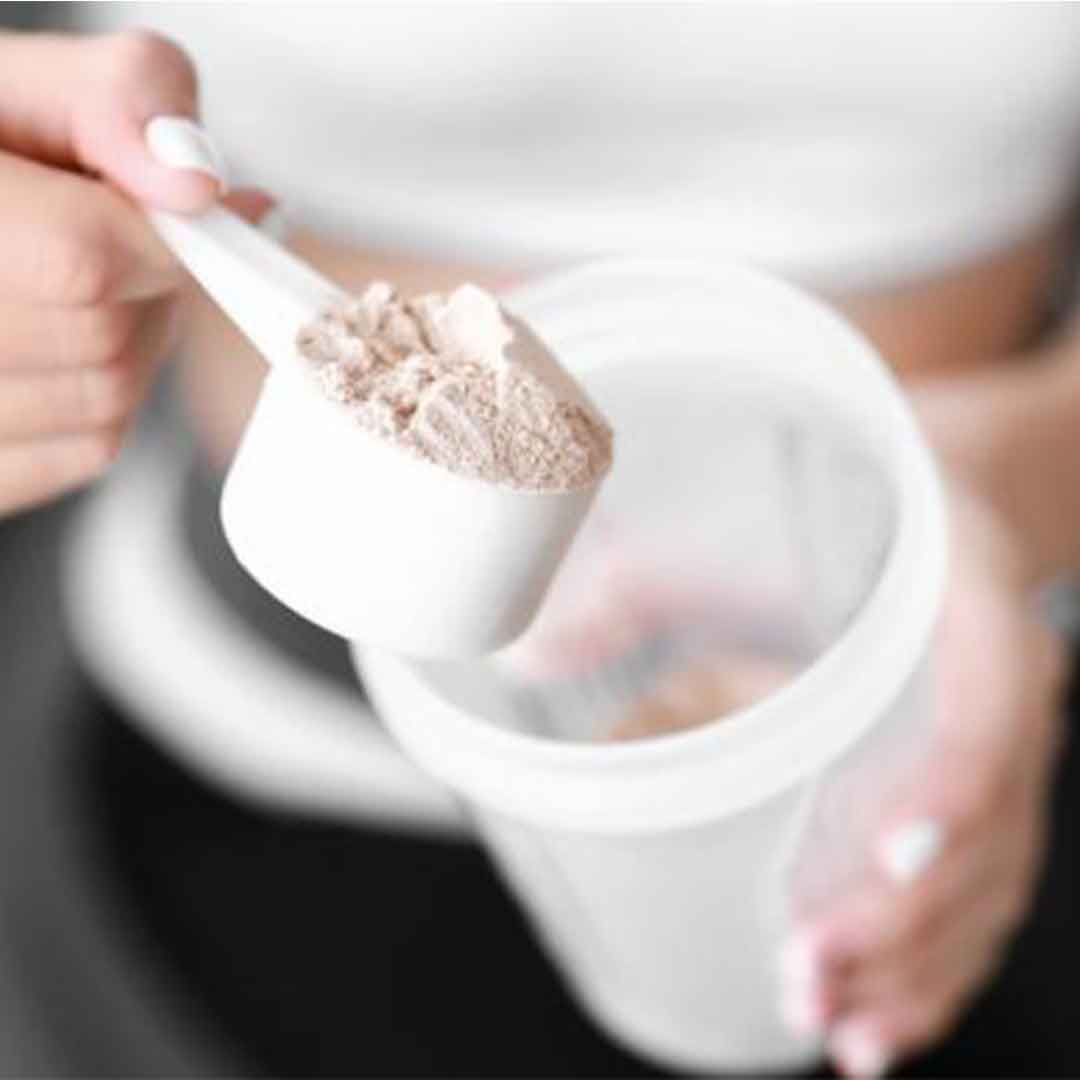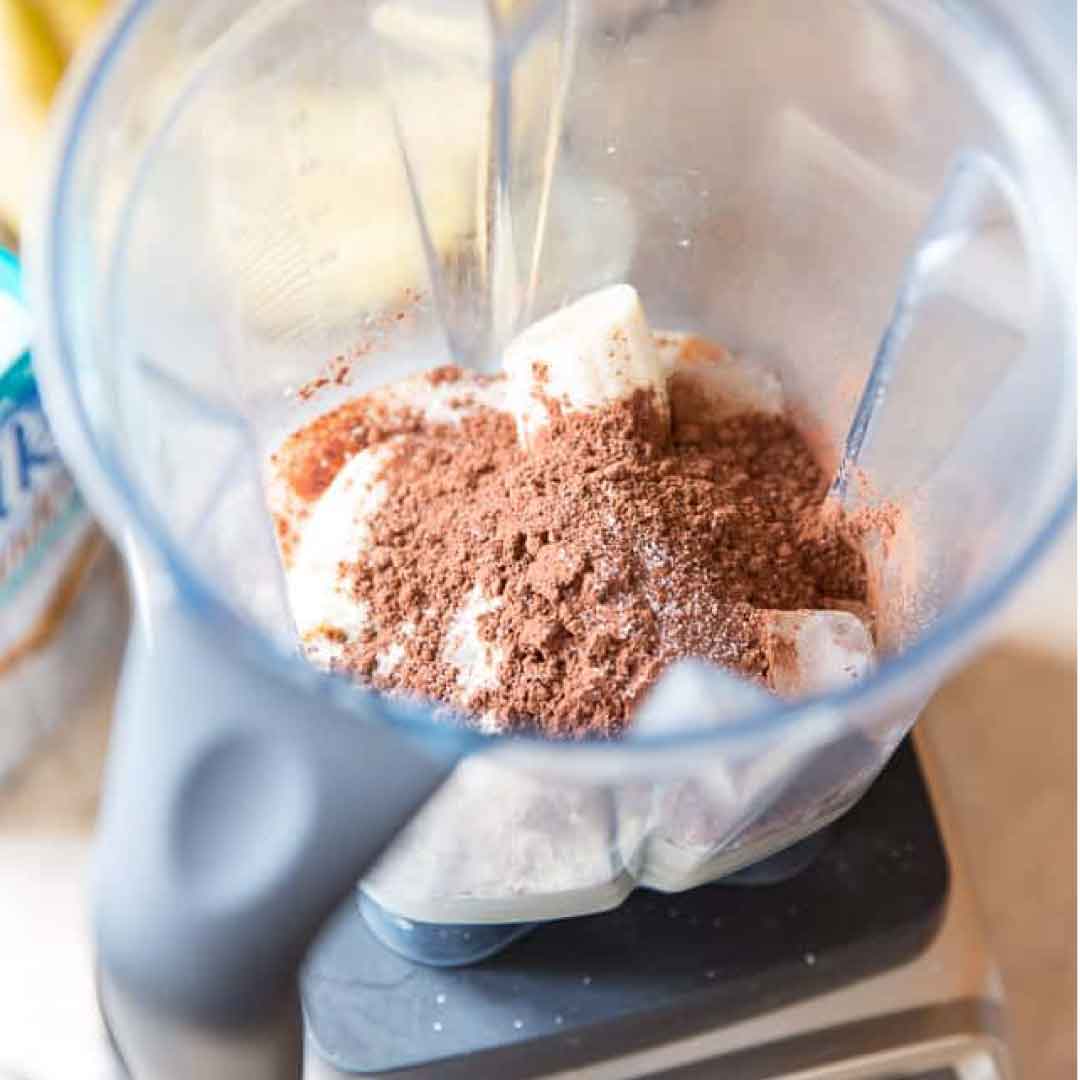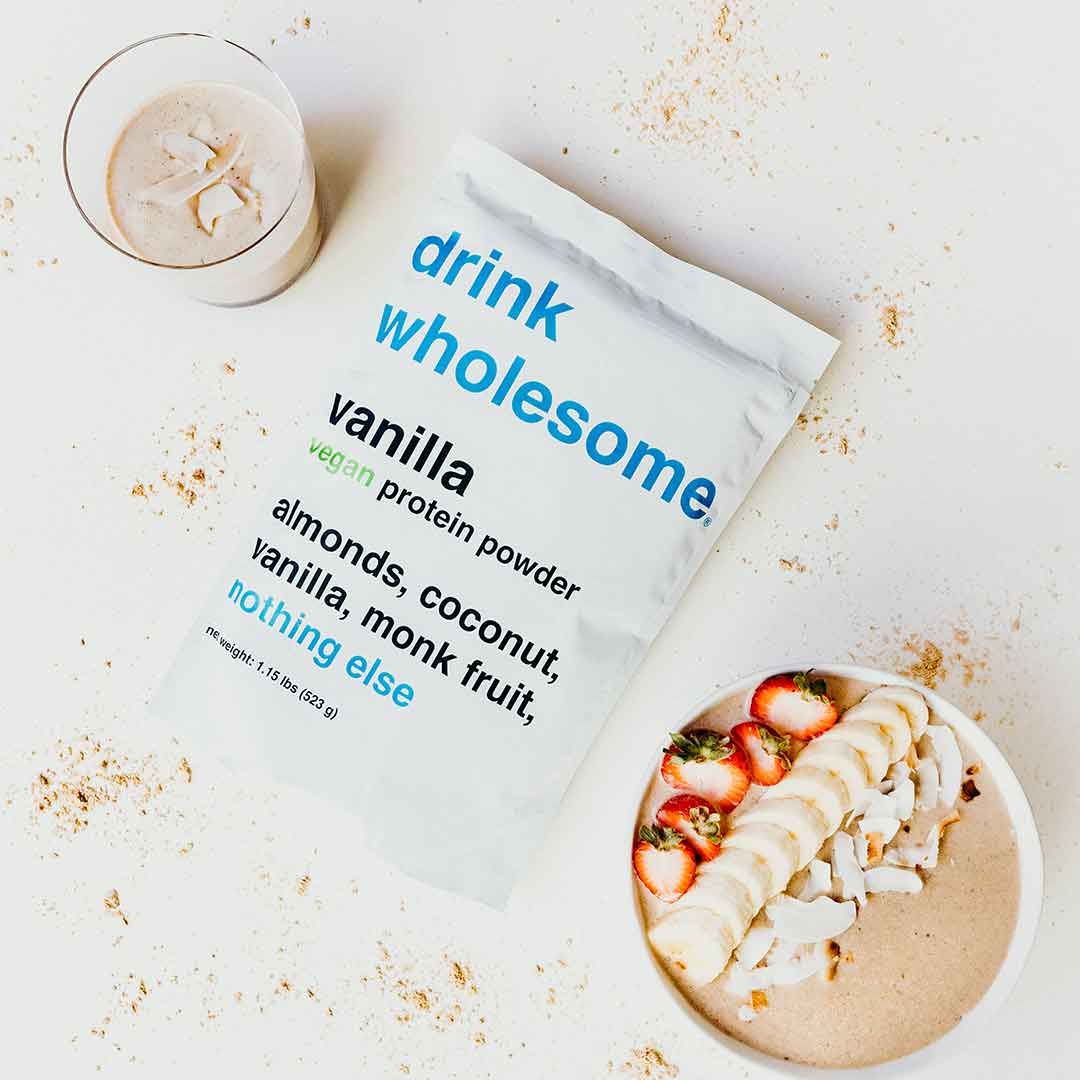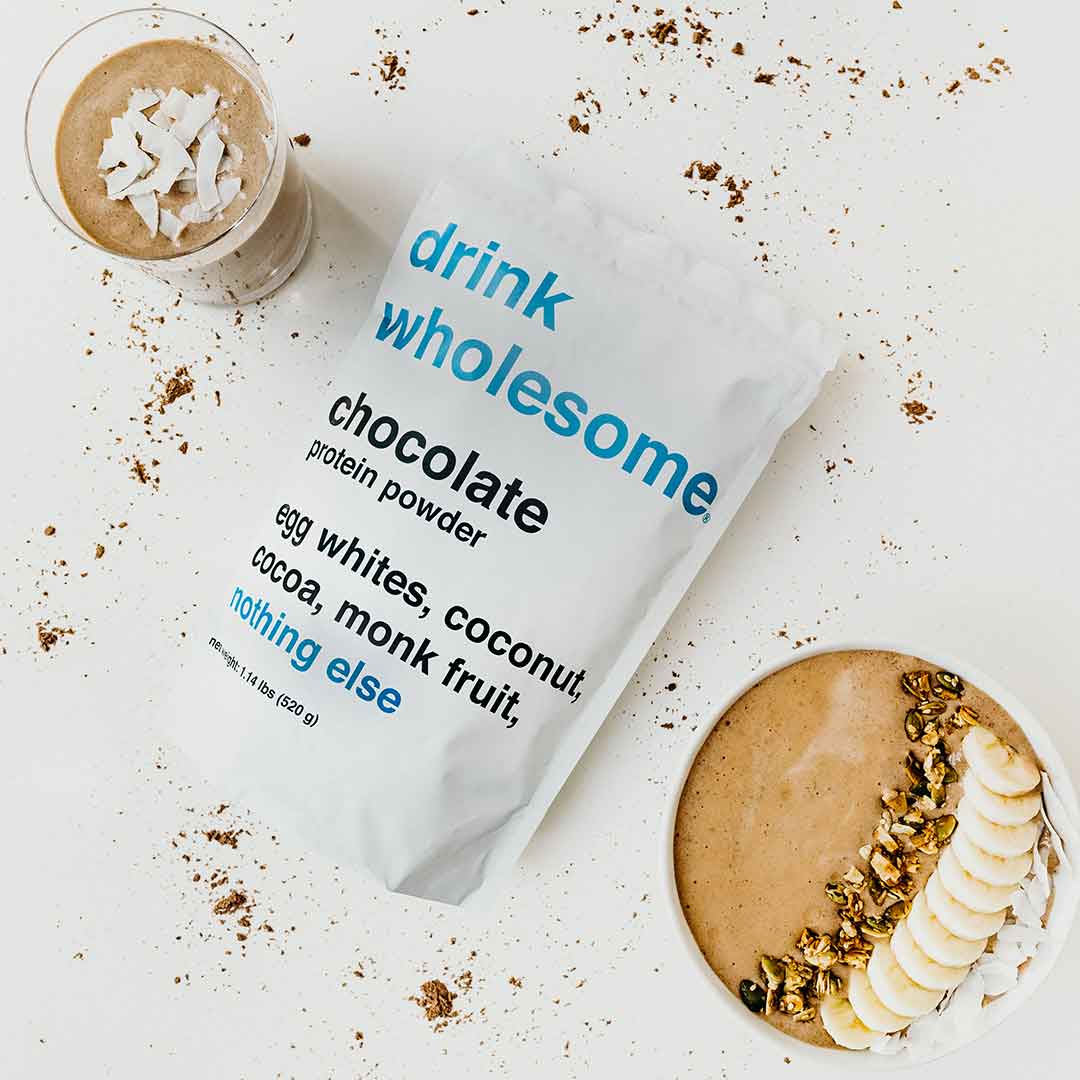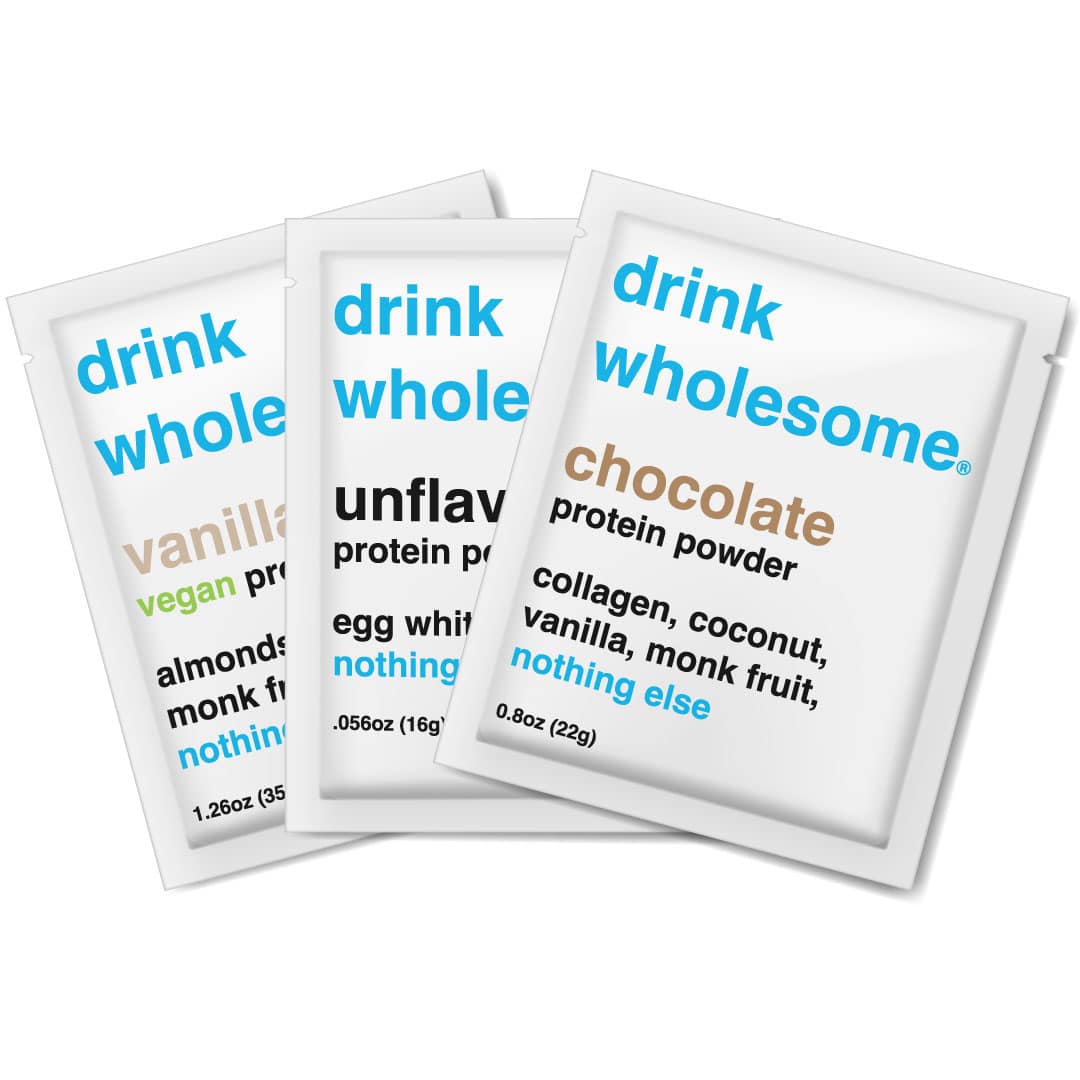Protein powder side effects.
Sick of protein powder side effects? Switch to drink wholesome. It is made with simple, safe ingredients. Order samples to see for yourself.
How to avoid protein powder side effects.
What are protein powder side effects?
Why drink wholesome?
What are protein powder side effects?
Protein powder side effects, also known as adverse reactions, are unwanted, undesirable symptoms caused by the consumption of protein powder. Common side effects of protein powder include acne, headaches, and digestive distress. This last one is really common. I would say that over one in 5 people experience bloating, constipation, diarrhea, gas, nausea, or stomach pain after drinking a protein shake. The severity of the side effects varies from person to person, but it is certainly not unusual to run to the bathroom or feel terribly bloated using protein powder.
Although many people experience whey protein powder side effects, protein powder side effects are usually caused by added ingredients, not the protein itself. It is therefore important that you read the ingredient list before buying a protein powder. Look out for ingredients that you do not recognize, and as a rule of thumb, avoid ingredients that you cannot pronounce. Ingredients like these are likely heavily-processed and look nothing like real food.
Heavy metals?
A non-profit called the Clean Label Project claims that most protein powders contain lead, and that vegan protein powders contain, on average, twice the amount of lead per serving as protein powders made from animal products. They also claim that plant-based protein powders contain mercury, cadmium and arsenic, in some cases at levels above regulatory thresholds. Even though heavy metals can be dangerous, these findings are not particularly concerning.
There is no such thing as a heavy metal-free vegan protein powder. All plant-based protein powders contain heavy metals, and simply because there are detectable amounts of heavy metals in these foods does not render them unsafe to consume, nor does it discount the benefits they offer as part of a balanced diet.
To put matters into perspective, according to a study by the U.S. Food and Drug Administration, we consume more metals from common foods, like kale, apples, and avocados than we do from plant-based supplements. In other words, if you are eating a healthy serving of any of these foods, you are probably ingesting more heavy metals than you would from a serving of vegan protein powder.
Kidney damage?
Research suggests that high dietary protein intake may increase the risk for chronic kidney disease in individuals with impaired kidney function. The metabolism of dietary protein creates waste, which kidneys filter. Eating a lot of protein, especially animal protein, forces our kidneys to work harder, which may lead to kidney damage. This is only a concern for people with impaired kidney function, however, and there is little to no evidence that a high protein diet has a detrimental effect on kidney function in healthy persons.
Malnutrition?
Relying too heavily on protein powder as a protein source can lead to malnutrition. Whole food dietary proteins typically provide a range of other nutrients like vitamins, minerals, and fiber, whereas most protein powders do not. It is therefore important to eat a balanced diet that includes a variety of nutrient-dense foods.
Why drink wholesome?
drink wholesome is additive-free.
One of the reasons why our protein powders do not cause side effects is that we do not use food additives. Most protein powders, on the other hand, are full of food additives.
Food additives may improve characteristics like taste, texture, and shelf stability, but they can also cause uncomfortable side effects and long-term gut damage. Basically, because they look nothing like real food, food additives are hard to digest. They therefore sit in your gut for longer than food should, which gives your gut bacteria more time to eat. As they eat, these bacteria produce gas, causing bloating and stomach pain.
Gas also slows colonic transit (the amount of time it takes food to travel through the colon), which can lead to constipation. Over time, food additives can add up (especially if you drink a protein shake every day), and disrupt regulatory pathways in the intestine. Eventually, this can lead to the development of inflammatory bowel disease (IBD) and systemic inflammatory disorders.
When buying protein powder, one additive to avoid in particular is artificial sweeteners. Artificial sweeteners are among the most harmful food additives in the long term as they alter the composition of your gut microbiota. This can lead to serious, chronic GI problems, widespread inflammation, and permanent damage to the gut microbiome.
Some sweeteners, especially sugar alcohols like xylitol, are poorly absorbed by the gut, meaning they feed your hungry gut bacteria. They can also cause diarrhea because they draw water into your intestines. Now you may finally have something to blame for those post-protein shake trips to the bathroom!
Here is a list of the most common food additives in protein powder:
acacia gum, acesulfame potassium, artificial flavors, aspartame, carrageenan, cellulose gum, dextrin, dextrose, erythritol, gellan gum, guar gum, gum arabic, inulin, locust bean gum, “natural” flavors, maltodextrin, rice syrup solids, soy lecithin, silica, sucralose, sunflower lecithin, xanthan gum, xylitol
When it comes to identifying food additives, go with your gut. 😉 As a rule of thumb, additives are ingredients that you cannot pronounce. Food additives are not the only thing to avoid when buying protein powder, however. There are several other ingredients that can upset your stomach.
the alternative:
Protein Matrix Comprised of (Whey Protein Concentrate, Whey Protein Isolate, Calcium Caseinate, Micellar Casein, Milk Protein Isolate, Egg Albumen, Glutamine Peptides), Polydextrose, Sunflower Creamer (Sunflower Oil, Corn Syrup Solids, Sodium Caseinate, Mono- and Diglycerides, Dipotassium Phosphate, Tricalcium Phosphate, Soy Lecithin, Tocopherols), Natural and Artificial Flavor, MCT Powder (Medium Chain Triglycerides, Nonfat Dry Milk, Disodium Phosphate, Silicon Dioxide), Lecithin, Cellulose Gum, Salt, Yellow 5, Sucralose, Acesulfame Potassium, Papain, Bromelain.
*This is the actual ingredient list of one of the best-selling protein powders in the United States.
drink wholesome is dairy-free.
Another reason why our protein powders do not cause side effects is that we do not use dairy-based proteins. Many protein powders are made with whey and casein, which are byproducts of cheese and yogurt production, and known to cause digestive issues. This is especially true for people with lactose intolerance and irritable bowel syndrome (IBS).
Over one in three Americans are lactose intolerant, and the prevalence of IBS is somewhere between 10 and 15 percent in the United States. Irritable bowel syndrome (IBS) is a poorly understood condition, and it is unclear why dairy triggers symptoms. Lactose intolerance, on the other hand, is clearly understood. People with lactose intolerance are unable to fully digest lactose, the sugar in dairy. As you just learned, partially digested food feeds the bacteria in your gut, which produce gas and cause side effects.
drink wholesome is made with real foods.
A final reason why our protein powders do not cause side effects is that we do not use protein isolates. Most protein powders, on the contrary, are made with protein concentrates and/or isolates, foods stripped of everything but the protein. They appear on the ingredient list as “pea protein” and “whey protein” as opposed to “peas” and “whey.”
I will not go into the details, but protein concentrates and isolates undergo heavy mechanical and chemical processing before becoming protein powder. Sometimes, manufacturers use chemical solvents like hexane to isolate (separate) the protein from the food. This means that what you end up putting into your body looks nothing like real food.
If you think about it, your gut was designed to digest naturally occurring foods, not laboratory formulated imitations, so if you feed it anything but real food, it might get upset. The long term implications of eating processed foods like protein isolates are still not well understood, but more and more research is finding that it can alter the composition of your gut microbiota, and lead to permanent damage to your gut microbiome.
Your gut does more than just help you to digest food; it protects against pathogens, educates your immune system, and affects directly or indirectly most of your physiologic functions. Disruptions to the gut microbiome have therefore been linked to the development of many chronic diseases. It follows that it is in your best interest to avoid protein powders made with protein concentrates and isolates.
Instead of using protein concentrates or isolates, we make the best protein powder with whole foods like egg whites and almonds. Egg whites are simply pasteurized and dried before becoming protein powder. Almonds are just roasted, pressed to remove some of the oil, and ground. Whole foods like these are an easy to digest, gut-friendly alternative to protein concentrates and isolates.
Whole foods contain a variety of enzymes and other digestive aids that help to break down the food, making it easier for the body to absorb the nutrients. Protein isolates and concentrates, on the other hand, have been stripped of these digestive aids, making them harder for the body to digest and absorb. Moreover, minimally-processed plant-based foods like almonds are rich in fiber, which helps promote healthy digestion and regular bowel movements.
Unless you have a sensitivity or allergy to eggs, egg white protein is the best protein for your gut. Egg whites are low in fiber, low-FODMAP, naturally alkaline, and have the highest protein digestibility-corrected amino acid score (PDCAAS) of any whole food. Our customers have experienced fewer digestive issues with egg white protein powder than with any other type of protein powder.
If you cannot eat eggs, try our vegan almond protein powder. We prefer almonds to other plant protein sources because they are more gut-friendly. Research suggests that almonds possess prebiotic properties that can improve the diversity and composition of the gut microbiome.
★★★★★
“I’ve had Crohn’s disease for 20+ years and it’s always been hard to find a protein powder my stomach can handle. I’ve had no problem digesting drink wholesome AND it tastes great. I highly recommend this protein powder if you have IBS or Crohn’s.” – Jesse
Read more reviews or take the quiz.
drink wholesome does not cause side effects.
Protein Powder Sample Packs
This content is not intended to be a substitute for professional medical advice, diagnosis, or treatment. drink wholesome is not intended to diagnose, treat, cure or prevent any disease.


